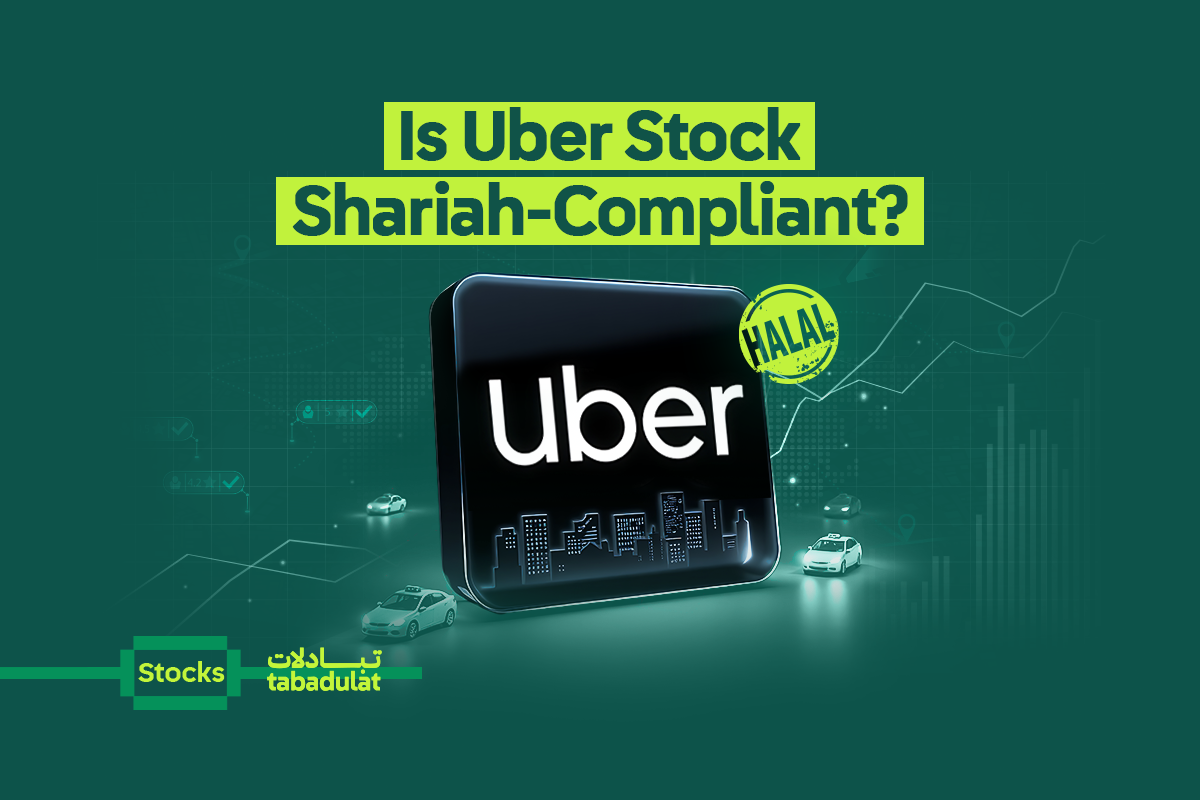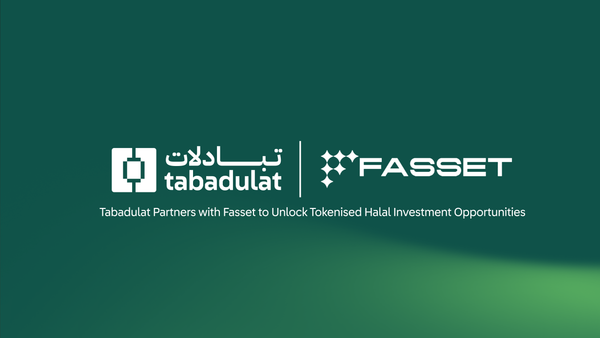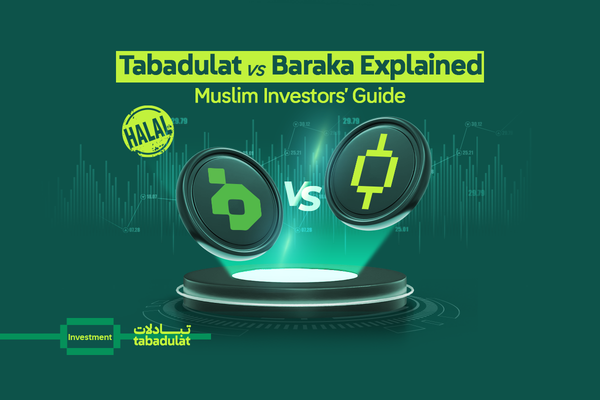Riding to Invest: Is Uber a Halal Investment?
Is Uber a Halal investment? This guide applies AAOIFI Shariah standards to Uber’s business activities and financials to determine compliance for Muslim investors. Find out if Uber is Halal to buy now.

Often considered the pioneer in ride-hailing apps, Uber Technologies (Uber) has been synonymous with riders and investors over the past decade and a half. Now, the company is repositioning itself as a global platform for mobility, data, and logistics.
This transformation brings complexity. For Muslim investors a question continues to come up: Can a company rooted in cutting-edge technology be Halal to invest in or not?
Whilst Uber is driving into emerging areas of AI like autonomous vehicles, it’s no longer just about rides and deliveries, it’s about whether these new revenue streams, partners, and financing models align with Islamic finance principles.
In this blog, we’ll assess whether Uber’s stock is Halal to invest in. No matter if you’re a beginner or seasoned investor, this article seeks to support your decision-making as to whether it aligns with Islamic finance principles.
Halal Screening criteria
To understand if Uber’s stock is Shariah-compliant it’s important to use a Halal Screening methodology like Accounting and Auditing Organisation for Islamic Financial Institutions (AAOIFI).
For a full breakdown on AAOIFI standards, see our previous blog. Also see our explainer on why a Halal Stock Screener is important when it comes to Halal Investing.
AAOIFI standards are among the most widely accepted among Islamic finance practitioners and investors.
It involves a two-step screening process in order to give Muslim investors a holistic picture of whether a company’s core activities and financials adhere to Islamic financial principals.
Business activities
The first part of AAOIFI’s screening methodology is to investigate the company's main activities. This is to ensure the business is involved in Halal activities and not impermissible (or Haram) sectors. These would include:
- Alcohol
- Gambling
- Pork-related products
- Conventional finance (like interest-based lending or insurance)
- Entertainment (such as adult or inappropriate content)
Financial screens
If a company passes the business screening element, it’s then important to look at their financial situation.
Remember, even if a company passes the activities screens but fails financial screening then it would be considered non-compliant.
AAOIFI has three financial ratios:
- Interest-Bearing Debt: Total interest-bearing debt should not exceed 30% of the company’s market capitalisation.
- Interest-Bearing Deposits: Total interest-bearing deposits should not be more than 30% of the company’s market capitalisation.
- Impermissible Income: Impermissible Income from non-halal activities (like interest income) should not exceed 5% of the company's total revenue.
Now let’s apply this framework to Uber.
We’ll be using the company’s latest public financial report based on its first quarter figures (for the period ending 31 March 2025), which was published on 5 May 2025.
The company reported a total revenue of $11.5bn in the first three months of this year.
Uber’s business activities
Established in 2009, Uber is a ride hailing app that is involved in different services. The company operates broadly in three segments, namely:
- Mobility-connects customers to drivers in a variety of vehicles like cars, auto rickshaws, motorbikes, minibuses or taxis.
- Delivery-this connects customers to search and discover local restaurants, order meals (either through delivery or pick-up) as well as order groceries and convenience goods.
- Freight-this connects carriers with shippers using Uber’s platform and enables carriers
Under AAOIFI’s criteria for screening Halal stocks, Uber’s core business activities would be considered Halal.
Uber financials
Now that we’ve reviewed Uber’s business activities, it’s time to look at the company’s financial situation.
Under AAOIFI’s standards, there are specific financial ratios to ensure a business is not over reliant on interest (or Riba), unsustainable debt level and Haram income.
Interest-Bearing Debt
- The Rule: Total debt (whether short-term or long-term) does not exceed 30% of market capitalisation
- Calculation: ($9.57bn /$178.6bn) *100= 5.36%
- Result: Extremely low and well within the limit. PASS
Interest-Bearing Deposits
- The Rule: Interest-bearing deposits must be less than 30% of market capitalisation.
- Calculation: ($16.9bn /$178.6bn) * 100 = 9.46%
- Result: Very healthy and well below the threshold. PASS
Haram Income
- The Rule: Impermissible income cannot exceed more than 5% of total revenue
- Calculation: ($220m/$11.5bn) * 100 = 1.91%
- Result: This is below the 5% threshold. PASS
The Verdict: Uber passes AAOIFI’s screening for Halal Stocks and would be considered Halal to buy and trade, based on its current financial report.
However, while Uber may be Halal to invest in at the moment, financial circumstances can change. A new debt issuance or buying of more interest-bearing securities could compromise its Halal status.
That’s why it’s important for Muslim investors to regularly monitor a company’s activities and finances.
Tabadulat Invest without compromise
We understand that not everyone has the time to examine a company or its financial reports every quarter.
That’s where Tabadulat comes in. We do the work, so you don’t have to.
You’ll be able to use our free Halal Stock Screener, which will screen 40,000 global stocks and ETFs daily. In addition, we use AAOIFI standards to ensure that you will only be able to buy and trade Halal stocks, ETF and Halal investments. remain Shariah-compliant.
We understand that markets are not static and neither are your investments. If a stock in your portfolio becomes non-compliant, we'll notify you so you can take appropriate action.
By law, our platform and methodology require the approval of Islamic finance scholars. That’s why we’ll have a Supervisory Shariah Board to monitor our activities and ensure we are 100% Shariah-compliant.
Whilst your profits are Halal it’s important to also purify them. That’s why we’re also creating a built-in Zakat calculator to cleanse your income to align with your Zakat obligations.
Our mission is to bring Halal investing with ease and transparency, so you can build a portfolio that aligns with both your financial goals and your faith.
FAQs
Is Uber a good stock to buy right now?
Whether Uber is a good stock to buy depends on your personal investment strategy, risk tolerance, and long-term goals. From an Islamic finance perspective, Uber currently meets AAOIFI Shariah compliance screening based on its business activities and financial ratios. However, the stock market is volatile, and conditions can change quickly. Always carry out your own research and seek guidance from a qualified financial advisor before making any investment decisions.
Is Uber profitable in 2025?
As of 2025, Uber has shown improved financial performance compared to previous years, with signs of moving towards sustained profitability. Analysts attribute this to growth in ride-hailing, food delivery, and cost optimisation. However, profitability can fluctuate due to factors such as market competition, fuel prices, and regulatory challenges.
Is it too late to invest in Uber?
It’s never entirely “too late” or “too early” to invest, as timing depends on your entry price, investment horizon, and financial objectives. While Uber has demonstrated growth potential, market conditions and company fundamentals should guide your decision. For halal investors, it’s essential to regularly check Shariah compliance, as financial ratios and revenue sources can change.
Is Uber stock overvalued or undervalued?
Uber’s valuation depends on various factors including revenue growth, profitability outlook, and overall market sentiment. Some analysts consider Uber fairly valued based on its growth prospects, while others believe it may still be overvalued compared to industry benchmarks. For investors following Islamic finance principles, remember that valuation alone is not sufficient. Shariah compliance and long-term fundamentals also matter.
Is Uber stock a buy for 2025?
Whether Uber is a “buy” in 2025 depends on your investment goals, risk appetite, and ethical screening preferences. Uber currently passes common Shariah compliance criteria, but this status can change over time. Market trends such as increased competition, regulatory developments, and innovation in technology will also influence future performance.
Where will Uber be in 5 years?
Forecasting Uber’s position in five years involves speculation, but analysts expect continued growth in mobility, delivery services, and potential advancements in autonomous vehicle technology. However, this will depend on global market trends, regulation, and the company’s financial stability. For Islamic investors, monitoring ongoing Shariah compliance is essential, as ratios and income sources can evolve.





